- Home
- Brian Falkner
Clash of Empires Page 20
Clash of Empires Read online
Page 20
“You are alive only by my grace,” Thibault says at last. “Spies are to be executed immediately on capture.”
“I am no spy,” the lieutenant says. “I am a soldier on a soldier’s mission.”
“You wear a French uniform,” Thibault says. “That makes you a spy.”
“I am no spy,” the lieutenant says, spitting on the ground in front of him.
Thibault stares at the spittle for a moment before continuing.
“A soldier,” he says.
“I am Lieutenant Hew McConnell,” the lieutenant says. “A soldier in the Fifth Artillery and the son of a nobleman.”
“A soldier and a nobleman,” Thibault says. He smiles, and it is clear that the British lieutenant misinterprets the reason for it.
“My father is Lord Byron McConnell of Inverness,” McConnell says. “He will pay a handsome reward for my return.”
“Yes, soldiers can be ransomed,” Thibault says evenly. “But spies cannot. If you are a soldier, you must be a brave one, to be on so dangerous a mission.”
“There is none braver,” McConnell says, then pales as he realizes the trap he has fallen into.
“Convince me, then,” Thibault says. “Tell me of your mission.”
“I will not, sir,” McConnell says.
“The mission is already a failure,” Thibault says. “We captured or killed all of your men. What harm can it do to reveal details of a mission that will no longer take place?”
“I am a man of honor,” McConnell says. “Surely you would not expect me to talk to the enemy.”
“A spy has no honor,” Thibault says.
“I am no spy,” McConnell says.
“This becomes repetitive,” Thibault says, standing and pacing. “There are two very simple possibilities in front of us. Either you are a soldier, which you can prove by revealing details of your mission, or you are a spy. I will give you exactly five seconds to choose which you are. At the end of the five seconds, if I have had no response, I will take you for a spy and have you shot. One.”
“That is not enough time—”
“Two,” Thibault says.
“I will tell you,” McConnell says, his eyes darting desperately around the room as if looking for a means of escape. “I am no spy. But I want a promise that I will be ransomed back to my father.”
“Of course,” Thibault says, thinking how easy it is to lie to a desperate man. He crosses to a large table set against one wall and pulls back a cloth, revealing six long rockets. “You can start by telling me about these.”
“They are rockets,” McConnell says.
“I can see that,” Thibault says.
“They are flare rockets,” McConnell says. “Different colors. For signaling.”
“Signaling what?” Thibault asks.
McConnell hesitates.
“Three seconds,” Thibault says.
“Different colors mean different things,” McConnell says.
“Of course,” Thibault says.
“The yellow rocket was to signal that the battlesaurs were dead,” McConnell says.
“The battlesaurs?” Thibault asks, holding in check a sudden surge of anger. “What battlesaurs?”
“Here in Calais,” McConnell says.
“You were to infiltrate our camp and murder my saurs?” Thibault asks. “A foolish mission for foolish men.”
“A desperate mission for desperate men,” McConnell says.
“Who were you to signal?” Thibault asks.
McConnell sits mutely.
“Blücher,” Thibault says. From the expression on McConnell’s face he can see that he is right.
He smiles tightly. He looks forward to seeing Napoléon’s reaction to this news.
* * *
At the rear of the prison is an open courtyard where prison carriages stop to unload. Jack staggers into it as if drunk. He has seen many drunk people and has no difficulty in copying their loose, graceless movements.
A guard leans against the wall by the rear door of the prison. He straightens as Jack wanders clumsily inside, and calls out something to Jack in French.
Jack smiles and waves the wine bottle at him.
The guard calls out again, angrily waving his musket at Jack.
Jack pretends not to hear and wanders over to the wall of the courtyard, making as if to urinate. He steadies himself with one hand on the wall, the other clutching the wine bottle tightly. He hears footsteps and more angry French, then suddenly there is a hand on his shoulder, twisting him around.
Jack spins in that direction, the wine bottle coming up as he turns, smashing into the Frenchman’s temple. The bottle does not break, but the man’s head does, blood spurting as he drops, his eyes rolling back.
Jack drops to one knee, a fist raised above the man’s head, but he does not move. After a moment Jack relaxes.
The guard’s uniform is similar to his, but with a different jacket and helmet. Jack quickly strips off the unconscious soldier’s jacket and replaces his own. The helmet follows. He crosses to the door of the prison and tries it, but it is locked. Returning to the guard, he searches him for keys but finds none.
After a moment of thinking, he raises his fist and raps loudly on the wooden door. Footsteps sound inside and there comes the sound of a key in the lock.
The door opens and another guard peers out, confused to find Jack standing there. Jack waits only to check if there are other guards behind this one before the bottle again does its work.
The guard, with his mouth still framed in the beginning of a question, sinks to his knees before toppling to the floor.
This time the bottle has shattered and the sound of the glass on the floor seems like thunder to Jack, but there are no shouts of alarm, no running bootsteps.
When he is convinced that all is quiet, he closes and locks the door behind him, pocketing the key.
He is in a short corridor that joins a larger, longer corridor. A door is open halfway along, and through it he can hear voices, laughter, and the sound of glasses. The French troops are enjoying a meal and wine.
Without looking in he walks steadily, but as quietly as he can, down the corridor. He passes the open door without alarm.
The walls are made of rough-cut stone blocks, and lit only by lanterns every few paces.
This corridor leads to yet another. Glancing one way, he sees a number of guards and large doors that he presumes are the main prison entrance. The other way, presumably, leads to the cells.
There are footsteps now from that direction and a man approaches. Unable to avoid being seen, Jack puts his back to the man and raises the glass of the nearest lantern, as if checking the wick. This takes a moment, then he moves to the next lantern.
Now the man emerges from shadows into the light and it is all Jack can do not to run from the place. He barely manages to stop his knees from shaking so hard that he would fall to the ground.
The man is grotesque, a hideous, deformed, blackened thing, surely the devil that the rumors speak of. But now as the figure draws closer, Jack sees that it is not the devil. It is a man, and one Jack has met before, in the tunnels of the Antwerp sewers. It is Napoléon’s general Thibault. But not as he was then. Part of one arm is gone and his skin is blackened and blotchy. His face has been mauled and scarred, and one eye is missing.
Jack clamps his lips together to prevent himself from crying out.
Thibault glances at him incuriously as he passes, a tight smile playing on his lips, his mind clearly on other things.
Only after he has passed does Jack step into the main corridor and walk quickly in the opposite direction from Thibault. Toward the cells.
Footsteps sound in the side corridor and he ducks through an open doorway into a darkened room. In it are a table and chairs. There are bloodstains on the floor and on the walls. Rusty iron shackles hang from the wall in a number of places. Jack does not like this place.
The footsteps outside draw closer, and there is a consta
nt buzz of conversation. Jack cannot understand a word of it, and he hopes they do not intend to use the room he is hiding in. He has no weapon left but the stone. He has the guard’s pistol, but he dares not use that for fear of attracting attention.
The voices stop, almost at the door, and the conversation continues. Jack shivers in the darkness, staring at the bloodstained shackles, and waits.
* * *
“So the yellow rocket is the signal for Blücher to attack?” Napoléon asks.
“Yes, Emperor,” Thibault says.
“To attack me?” Napoléon asks, steam building behind his eyes.
“An outrage,” Thibault says.
“Treachery!” Napoléon thunders, kicking at the table before him, which crashes to the floor.
A ceramic box smashes and snuff disperses in a cloud.
“He will withdraw when he does not see the rocket,” Thibault says.
“Perhaps,” Napoléon says. He stands and paces. His breath seems short, and he stops, resting for a moment with one hand on the arm of his chair. “But even if he withdraws, what is to stop him from returning after my main force crosses the Channel? The man is a traitor. What is to stop him from attacking the remainder of my army here in Calais? They will have no battlesaurs to protect them. We take London while he marches on Paris!”
“You think him capable of such betrayal?” Thibault asks.
“I have no doubt about it. Blücher”—Napoléon spits out the name as though it were an insect that had flown into his mouth—“sits with his army on the fields at Waterloo professing loyalty to the empire, but the old warhorse is just biding his time. No, Blücher’s army must be destroyed.”
“The Prussians are our allies, Emperor,” Thibault says.
“We are not allies. Blücher will never be our ally. We will turn this to our advantage. Prepare our armies, then fire the yellow rocket. Let him come. When he does, he will find the wrath of the man whom he betrays. Crush his artillery with my battlesaurs. Smash his army with the fists of my artillery. Surround him. Destroy him. When we are finished, his army will be nothing but bloody scraps on the battlefield and boys crying for their mothers.”
“Blücher is no fool,” Thibault says. “He will not uproot his army and march it here to Calais in the hope of seeing a yellow rocket.”
“True,” Napoléon says. “We must give him reason to believe the British infiltrators are still alive. Spread a rumor that they got away. Make it believable. That is sure to lure the old battleax forth.”
“You are the god of war,” Thibault says.
“And you are my devil,” Napoléon says with a sly grin.
Thibault acknowledges the dubious honor with a slight nod of his head. Of course Napoléon would know what the men say about him.
“And here is the best part,” Napoléon says. “Then we fire the green rocket. The Royal Navy will depart, believing my army to be engaged in battle, and thus their departure will open the front door to England.”
“Genius,” Thibault says.
Napoléon paces for a few moments, his hands clasped behind his back.
“Blücher knows of our battlesaurs deep in the Sonian,” he says.
“Undoubtedly,” Thibault agrees.
“He would not risk an attack if he thought he might face battlesaurs from his rear,” Napoléon says.
“You think he plans an assault on the cave?” Thibault asks.
“If not Blücher, then the British,” Napoléon says. “It is what I would do.”
“I will order extra guards into the cave,” Thibault says. “Enough to thwart the most determined assault.”
Napoléon does not respond, but continues to pace.
“You are sure of these signals?” he asks. “If it is wrong, my plan will be a disaster.”
“The information was gleaned from one of the captured soldiers,” Thibault says.
“I will interrogate this soldier myself,” Napoléon says. “I want to be sure he speaks the truth.”
“He will not talk in the presence of the other soldier,” Thibault says.
“Then we must remove him to a different location,” Napoléon says.
“Of course.” Thibault takes a pair of pistols from the table and places one in his side holster.
“Two pistols?” Napoléon asks.
“They are desperate and dangerous men,” Thibault says. “I should not risk the life of my emperor.”
* * *
As soon as the voices have faded, Jack is moving.
He uses his key to open a heavy iron door that leads into the cell block. Inside is a long row of cells, most of them with the doors standing eerily, rustily open. The cell block looks empty, except for two doors near the end of the corridor, which are shut. Close to those cells a guard sits on a wooden stool. He looks up as Jack approaches. He seems confused, and more than a little concerned. He says something in rapid French.
Jack opens his mouth as if to speak, then dissolves into a fit of coughing, hacking, and spitting, as if unable to get the words out, doubled over so the guard cannot see his face. He takes another few paces forward. The guard rises, reaching for his pistol. Jack coughs more and staggers forward a few more steps, now within range of the other man, who, still uncertain, has drawn his pistol but not cocked it.
Jack swings upward, the heavy stone he found in the street now clasped firmly in his right hand. It connects with the man’s chin, knocking his head backward, stunning him but not knocking him out. The guard fumbles with his pistol, drawing back the hammer. Jack grabs his wrist, twisting it away from him, desperate to stop him before a gunshot alerts the whole prison. There is a crack and the man grunts in pain. He grunts again as the stone connects with his temple once, and then another time to make sure. The French soldier lies awkwardly across the cell-block floor.
He does not appear to be breathing. Jack checks for a pulse, but there is none.
He looks up to find Lieutenants McConnell and Gilbert standing at the bars of their cells, staring at him incredulously.
“Jack?” Gilbert asks.
“I think he’s dead, sir,” Jack says. “He ain’t breathing.”
“Good for you, Jack,” McConnell says.
“I din’t mean to kill him, sir,” Jack says. “He weren’t trying to kill me.”
“Take his keys,” Gilbert says. “Get us out of here.” He stops, thinking. “Move the guard first. Drag him into an empty cell. In case anyone comes in.”
Jack runs back to the main door and locks it. He returns and grabs the guard by the ankles, dragging him toward a cell farther down the row.
McConnell starts talking as Jack works.
“Jack, listen to me,” he says. “Thibault knows everything. About the rockets, the colors, Blücher, everything. Whatever happens to us, you must get to Gaillemarde, to the rendezvous point. You must warn the others. Do you understand me?”
“Yes, sir,” Jack says. He rolls the Frenchman into a corner and tries to make it look as though he is sleeping. He takes the keys from the man’s belt. He is about to unlock the cell doors when the door starts to open at the end of the corridor.
He stops, unsure what to do.
“Sit down,” Gilbert hisses.
Jack quickly seats himself on the guard’s stool.
The door opens and he looks up, unable to stop himself gasping with surprise. There is no British soldier alive who does not know the shape and the face of the man who enters. Napoléon Bonaparte, the French emperor. He is followed by Thibault.
“Stand to attention,” McConnell mutters under his breath, and Jack immediately stands, ramrod straight, as if he was being inspected by the Duke of Wellington himself.
He scarcely breathes as the emperor approaches, Thibault a menacing shadow behind him. They stop at McConnell’s cell and Thibault says something in French.
Jack freezes, unsure what is being said.
Thibault speaks again, and still Jack does not move.
Both Napoléo
n and Thibault turn to look at Jack and behind their backs McConnell quickly mimes unlocking a door and points to the lock on his cell.
Jack fumbles with the keys. Fortunately there are only two on the ring, and only one that looks as though it would fit the cell door.
Thibault moves back, putting a little distance between himself and McConnell. He raises his pistol and aims it at McConnell as Jack unlocks the door and steps away.
McConnell steps out, now face-to-face with the French emperor. In English he says, “I’m not telling you anything.”
“You don’t need to,” Thibault says. Then comes the crash of a gunshot, echoing crazily off the walls.
McConnell staggers, grunts, opens his mouth, but collapses to the ground before he can make another sound.
Jack stares in disbelief at the hole in McConnell’s chest, just a dark circle on the white breast of his uniform. McConnell seems unable to form words. His lips move but no coherent sounds emerge.
“What the devil are you doing?” Napoléon shouts. “Are you mad? We were to interrogate this man!”
“In fact, that was never my intention,” Thibault says calmly. “I have already learned from him everything I need to know.”
He draws his second pistol and replaces the first one in the holster. He turns toward Napoléon and again the walls echo with the sound of a shot.
Napoléon stands still, his eyes wide in shock, but the expression is a falsehood. The fact that he is standing is another. He is a man dead on his feet, a bloodied hole in his forehead a clue as to the cause.
For almost a full second he stands, then all the muscles in his body seem to let go at once and he drops into an untidy pile of limbs on the floor.
Blood from his head wound pools and runs, mixing with McConnell’s.
Jack stares. Napoléon Bonaparte, the mighty leader, the most powerful man in the world, has been reduced to this. A jumble of bones in a sack of skin, oozing dark red blood.
McConnell’s lips are still moving and his eyes follow Thibault as he steps forward and places the still-smoking pistol in McConnell’s hand.
“I despise a man who cannot keep his secrets,” Thibault says. He takes a paper cartridge from a pocket and begins to reload the gun.

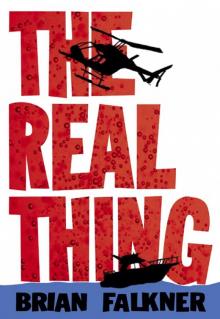 The Real Thing
The Real Thing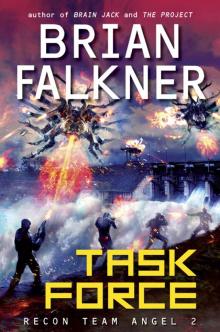 Task Force
Task Force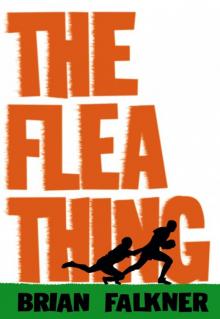 The Flea Thing
The Flea Thing The Project
The Project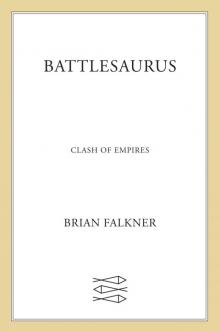 Clash of Empires
Clash of Empires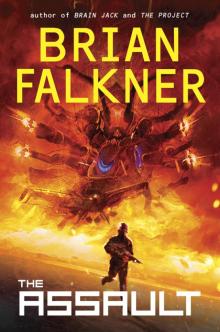 The Assault
The Assault Brain Jack
Brain Jack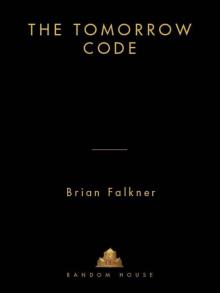 The Tomorrow Code
The Tomorrow Code Vengeance
Vengeance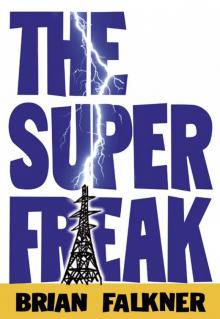 The Super Freak
The Super Freak Northwood
Northwood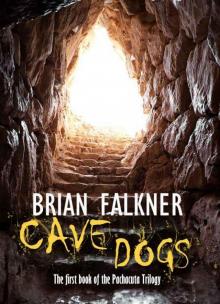 Cave Dogs (Pachacuta Book 1)
Cave Dogs (Pachacuta Book 1)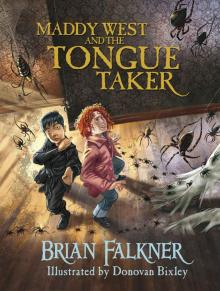 Maddy West and the Tongue Taker
Maddy West and the Tongue Taker